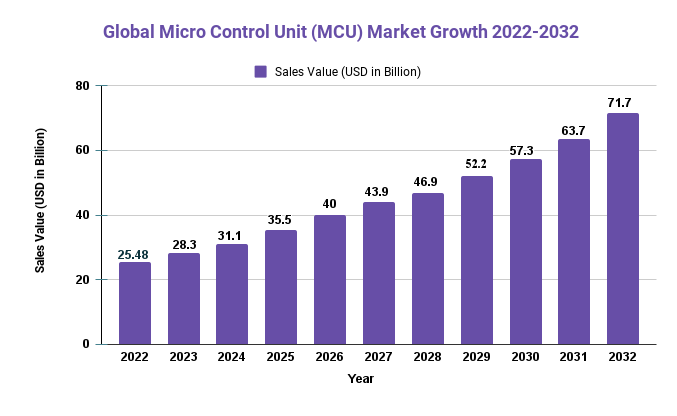Micro Control Unit (MCU) Market Size Is Set To Expand With CAGR Of 11.2% By 2032

Page Contents
Market Overview
Published Via 11Press: The Micro Control Unit (MCU) Market size is expected to be worth around USD 71.7 Bn by 2032 from USD 25.48 Bn in 2022, growing at a CAGR of 11.2% during the forecast period from 2022 to 2032.
The global Micro Control Unit (MCU) market has been witnessing steady growth in recent years due to the increasing demand for electronic devices across multiple industries. With the advent of smart technologies, these units have become an integral part of automobiles, industrial automation systems, and consumer electronics. They are compact and highly efficient, making them ideal for use in low-power applications where size is a major constraint.
The Asia Pacific region is expected to dominate the MCU market, owing to the rapid industrialization in countries such as China, India, and South Korea. Increasing investments by manufacturers in R&D activities aimed at improving production efficiency and reducing costs will further boost market growth. The demand for MCUs is also expected to rise in North America and Europe with the growing adoption of Internet of Things (IoT) based solutions.
Want to Access the Statistical Data and Graphs, Key Player's Strategies | Request a sample report

Key Takeaways
- Growing Demand: The demand for MCUs is on the rise due to an increasing prevalence of embedded systems across various industries such as automotive, consumer electronics, and industrial automation.
- Increasing Complexity: With the ever-increasing complexity of embedded systems, there is an increasing need for high-performance microcontrollers (MCUs).
- Advanced Features: The market is moving toward MCUs with advanced features, such as low power consumption, greater memory capacity, and enhanced processing power.
- Competitive Landscape: The MCU market is highly competitive, with major players such as Texas Instruments, NXP Semiconductors, and Renesas Electronics dominating the space.
- Asia Pacific Region: The Asia Pacific region is expected to dominate the market, due to the presence of major electronics manufacturers there and rising consumer electronics demand.
- Industrial Automation: The industrial automation sector is expected to be a major influencer of the MCU market due to the rising use of automation technologies across manufacturing and other industries.
- Internet of Things (IoT): The exponential growth in IoT is predicted to further fuel demand for MCUs, as they are an essential element in creating IoT devices.
- Security Concerns: As microcontrollers (MCUs) become more and more critical in systems such as automotive and industrial automation, there is an increasing need for MCUs with advanced security features to ward off cyber attacks.
Regional Analysis
- The North American region is a well-established market for microcontrollers (MCUs), with high adoption rates across various industries. The automotive and industrial automation sectors are driving demand for high-performance MCUs. Furthermore, major semiconductor firms such as Texas Instruments and NXP Semiconductors are present in the region which further fuels this growth.
- The European market for MCUs is driven by the automotive and industrial automation sectors, with an increasing need for energy-saving, high-performance devices. Furthermore, smart homes and smart cities technology require advanced MCUs with low power consumption rates and robust processing power.
- The Asia Pacific region dominates the MCU market, thanks to major electronics brands like Samsung, LG, and Huawei that have established operations there. This region's growing consumer electronics, automotive, and industrial automation sectors are driving demand for MCUs as well. Furthermore, this area serves as a breeding ground for Internet of Things devices further increasing MCU supply lines.
- The Middle East and Africa region holds a smaller share of the MCU market, its prospects are bright due to the increased adoption of automation technology across various industries, such as oil & gas and manufacturing.
- The Latin American market for MCUs is driven by the automotive and industrial automation sectors, with an increasing need for energy-efficient and high-performance MCUs. Furthermore, this region is witnessing a boom in smart homes and smart city technology, necessitating advanced MCUs with advanced features.
- Overall, the MCU market is projected to expand globally due to the increasing adoption of embedded systems and automation technology across various industries. Asia Pacific is expected to dominate this space due to the presence of major electronics manufacturers and increasing consumer electronics demand.
Drivers
- The demand for embedded systems is on the rise: As more industries, such as automotive, consumer electronics, and industrial automation, utilize embedded systems, the demand for MCUs continues to rise.
- Growth of the Internet of Things (IoT): As IoT expands, demand for microcontrollers (MCUs) will increase dramatically, as they form a vital element in creating IoT devices.
- Technology Advancements: The market is transitioning towards MCUs with advanced features like low power consumption, higher memory capacity, and enhanced processing power these factors are driving demand for high-performance MCUs.
- Industrial Automation: The industrial automation sector is a major driving force of the MCU market due to the rising adoption of automation technologies in manufacturing and other industries. Furthermore, demand for energy-efficient and high-performance MCUs is fueling this sector's expansion.
- Consumer Electronics: The growing demand for consumer electronics such as smartphones, wearables, and smart home devices are driving the demand for low-power and high-performance MCUs.
- Automotive Industry: The automotive sector is a major factor driving the MCU market, as MCUs are used in various applications such as infotainment systems, advanced driver assistance systems (ADAS), and engine management systems.
- Security Concerns: With the growing use of microcontrollers (MCUs) in critical systems such as automotive and industrial automation, there is an urgent need for MCUs with advanced security features to guard against cyber attacks.
- Overall, the MCU market is expected to witness steady growth due to rising demand for embedded systems, IoT, and technological advancements. Major driving forces behind this market include the industrial automation, automotive, and consumer electronics sectors.
Restraints
- High Competition: The MCU market is highly competitive, with several major players dominating it. This can cause pricing pressure and reduced profit margins for MCU manufacturers.
- High Development Costs: Designing advanced MCUs with features such as low power consumption, higher memory capacity, and enhanced processing capabilities can be expensive. This limits the number of manufacturers in the market and hinders innovation.
- Security Concerns: Security is a major driver of the market, but it also poses challenges, as creating secure MCUs can be time-consuming and expensive. This has limited their application in critical systems due to complexity and expense.
- MCU Adoption in Certain Industries: Although MCUs have seen widespread adoption in industries such as automotive and industrial automation, they have yet to gain traction in other fields such as healthcare or defense. This could limit the market's potential growth trajectory.
- Impact of COVID-19 on MCU Market: The COVID-19 pandemic has had an adverse effect on the MCU market, leading to disruption in supply chains and reduced demand in certain industries such as automotive.
- Overall, the MCU market is expected to expand further however, it also faces some obstacles such as high competition, expensive development costs, and limited adoption in certain industries. To stay competitive in this space, manufacturers must continue innovating and addressing these obstacles head-on.
Browse the summary of the report and Complete the Table of Contents (TOC)
Opportunities
- Increasing Demand for IoT Devices: The growing interest in IoT devices presents a great opportunity for MCU manufacturers, as these microcontrollers are essential components in the creation of these gadgets.
- Advances in Technology: Technological advances such as artificial intelligence (AI) and machine learning (ML) are driving demand for MCUs with advanced features like low power consumption and high processing capabilities.
- Emerging Markets: Emerging markets such as India and China offer significant growth prospects for MCU manufacturers due to the rising demand for consumer electronics and industrial automation products.
- Electric and hybrid vehicles: The growing adoption of electric and hybrid vehicles offers MCU manufacturers a lucrative opportunity, as their microcontrollers (MCUs) are used in various applications like battery management systems and powertrain control.
- Smart Cities and Infrastructure: As cities worldwide move toward becoming smart, MCU manufacturers have an opportunity to develop MCUs with advanced features like low power consumption and connectivity that can support these applications.
- Cybersecurity: With the ever-increasing requirement for secure MCUs in mission-critical systems, MCU manufacturers with advanced security features now have an opportunity to stand out in the market.
- Overall, the MCU market offers significant growth prospects due to rising demand for IoT devices, technological advances, emerging markets, electric/hybrid vehicles, smart cities/infrastructure, and cybersecurity. To capitalize on these opportunities, manufacturers must focus on innovation and developing MCUs with advanced features.
Challenges
- Cost Pressures: MCU manufacturers are under constant cost pressures from customers seeking lower prices, as well as competition. This could result in reduced profit margins and restricted R&D investments.
- Increasing Complexity: MCUs are becoming increasingly complex with more features and higher processing capabilities, making them harder to design and manufacture. Short Product Life Cycles MCUs have short product lifespans, making it challenging for manufacturers to recoup their investments in R&D and remain competitive in the market.
- Intellectual Property (IP) Challenges: The development of MCUs necessitates significant investments in research and the protection of IP. Manufacturers should be aware of the dangers associated with IP infringement and theft, particularly in emerging markets.
- Supply chain disruptions: The COVID-19 pandemic has underscored the criticality of having an established supply chain, especially for companies that source components from multiple suppliers across different regions.
- Regulatory Challenges: The development and sale of MCUs are subject to various regulations and standards that may differ by region and industry. Manufacturers must follow these regulations in order to guarantee their products remain secure and dependable.
- Overall, the MCU market faces several obstacles such as cost pressures, increasing complexity, short product life cycles, IP issues, supply chain disruptions, and regulatory obstacles. Manufacturers must navigate these difficulties to remain competitive in this space and continue innovating.
Report Scope
| Report Attribute | Details |
| The market size value in 2022 | USD 25.48 Bn |
| Revenue forecast by 2032 | USD 71.7 Bn |
| Growth Rate | CAGR Of 11.2% |
| Regions Covered | North America, Europe, Asia Pacific, Latin America, and Middle East & Africa, and the Rest of the World |
| Historical Years | 2017-2022 |
| Base Year | 2022 |
| Estimated Year | 2023 |
| Short-Term Projection Year | 2028 |
| Long-Term Projected Year | 2032 |
Key Market Segments
Type
- 8-Bit
- 16-Bit
- 32-Bit
Application
- Industrial Automation
- Smart Homes
- Consumer Electronics
- Wearables
- Smartphones
Key Market Players included in the report:
- Microchip Technology
- Nuvoton Technology
- NXP
- Silicon Laboratories
- STMicroelectronics
- Texas Instruments
- Atmel
- Broadcom
- Espressif Systems
- Holtek Semiconductor
- Infineon
Frequently Asked Questions
What is the market study period?
The Micro Control Unit (MCU) Market is studied from 2017 – 2032.
What is the growth rate for the Micro Control Unit (MCU) Market?
The Micro Control Unit (MCU) Market is growing at a CAGR of 11.2%
Who are the major players in the Micro Control Unit (MCU) Market?
Microchip Technology, Nuvoton Technology, NXP, Silicon Laboratories, STMicroelectronics, Texas Instruments, Atmel, Broadcom, Espressif Systems, Holtek Semiconductor, Infineon
The team behind market.us, marketresearch.biz, market.biz and more. Our purpose is to keep our customers ahead of the game with regard to the markets. They may fluctuate up or down, but we will help you to stay ahead of the curve in these market fluctuations. Our consistent growth and ability to deliver in-depth analyses and market insight has engaged genuine market players. They have faith in us to offer the data and information they require to make balanced and decisive marketing decisions.